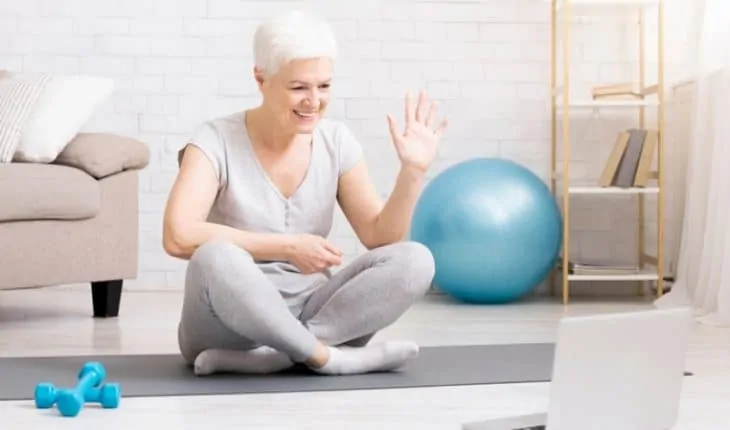The mantra ‘use it or lose it’ definitely applies to older people who take less exercise. ‘As we age, we naturally lose muscle mass at a steady rate, which is known as sarcopenia with ageing. But Even a short period spent in a sedentary lifestyle can dramatically increase this decline in muscle mass, metabolic health,’ says Caroline Clarke, an occupational therapist and community exercise programme officer at Age UK Oxfordshire.
One study, carried out by researchers at the University of Udine and the University of Padova in Italy, published in the Journal of Physiology in January 2018, found that healthy older people who were inactive for two weeks, showed a pronounced loss of muscle mass in their lower limbs, making it difficult for them to climb stairs for example. And it was difficult for them to regain muscle power after they became more active again.
‘Older people stuck at home can lose muscle mass rapidly which is a problem because it lessens strength and mobility. Sarcopenia typically accelerates past the age of 75,’ explains Clarke.
Age Concern Oxfordshire has just closed all 80 of its classes for older people because of the risk of Covid-19 infection. ‘That’s 1000 people who will now have to find other ways to stay fit. We can’t just have people sitting around on sofas and watching TV or they will get muscle wastage.’
Older people in Oxfordshire can request a free exercise DVD which is appropriate for all older people who want to exercise at home. It’s also available to everyone in the UK who can download it via the Generation Games website. www.generationgames.org.uk
Exercise safely and take precautions.
Older people need to careful about falls. ‘We want to prevent people from falling since they could fracture a bone or injure themselves in other ways. We aim to improve their balance by challenging balance but in a safe way. We encourage people to hold onto a back of a chair or works surface when they do their exercises,’ says Clarke.
‘If you go up on your toes ten times in a row, hold onto something like the kitchen sink while you are waiting for the kettle to boil.’
Get up on your feet once an hour. If sitting for longer periods, wiggle your toes and ankles for a few minutes every hour. ‘If you have a garden, take a stroll for 10 minutes several times each day. Try and walk briskly until you feel a little warmer and your breathing rate rises slightly. Gardening is great exercise if you are physically able. Wrap up and enjoy the fresh air,’ says Clarke.
Wear non slip footwear. Avoid sloppy slippers or socks which could slip from under you. Wear sturdy flat soled shoes or trainers with grip.
Don’t do something until it hurts. ‘It’s not really “no pain no gain” when it comes to exercise for older people. I would suggest that people work within their own range of movement and don’t push themselves beyond that. Definitely do stretches at the end of a session in order to relieve the muscles you have been using. We don’t recommend stretches at the beginning in case people overstretch tendons and muscles.
Wii and DVDs can help motivate people. There is a wide of exercise routines for older people available online including You tube and on Wii-fit. If you have one you like and suits your levels of ability, try and stick to a routine where you work out several times a week.
If people are steady on their feet, stair exercises can be a good idea. Warm up for 10 minutes before exercising on stairs. It depends on the person because everyone’s health does vary so much but most people will struggle to do more than a couple of minutes of stairs before having a rest. If you start feeling too breathless to answer a question in full sentences, stop. If you are feeling any ill effects like dizziness or palpitations, don’t continue.
Marching on the spot or tapping toes in time to moderate music can be a helpful way to safely elevate your heart rate. Don’t use excessively fast music because people tend want to keep up with it and may over do it.
If you haven’t done a lot of exercise for a long time, take advice if you can. ‘We would generally advise going to see a GP.’ If people go to the health information on the Generation Game website, there is information on exercise and cardiovascular disease, exercise and cancer and healthy eating.
- Gut microbiome could delay onset of type 1 diabetes - 3rd April 2025
- The da Vinci 5 Robot Is Set To Transform Bariatric Care: - 31st March 2025
- Beyond money: the hidden drivers fuelling child food insecurity - 31st March 2025






